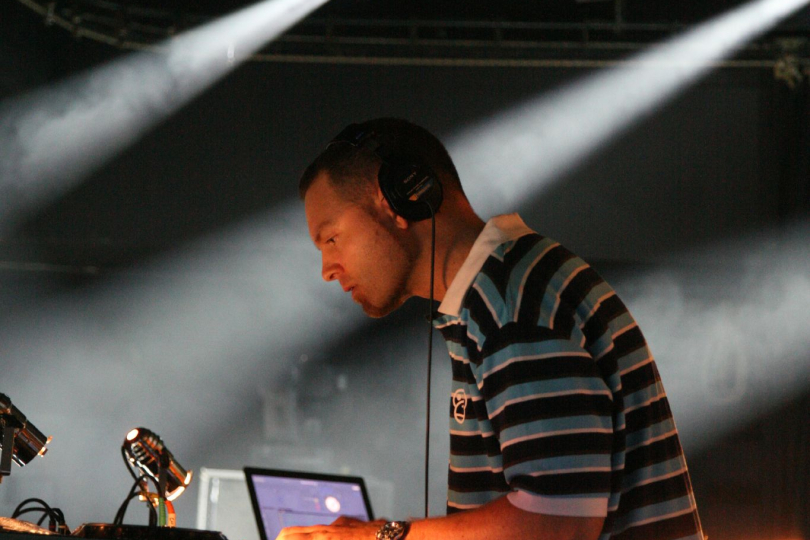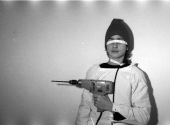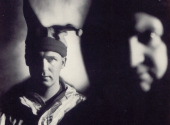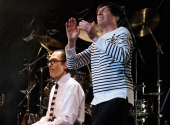
Milestones in Music History #58: DJ Shadow, The Refined Art of Sampling
Were you pleasantly dazzled by the sound of steel pipes, press machines and the industrial experimentation of Einstürzende Neubauten, protagonists of our last episode? Their avant-garde approach triggered a series of new and exciting musical acts. Although distant in musical intent, one of these acts resolved to change the art of sampling and the role of the DJ forever and became a true composer. Such a music innovator took on the name of DJ Shadow.
Who doesn't know a turntable? Although replaced today by playback devices that are much faster to use, more reliable and durable, the turntable has always been a fascinating object, which today is seeing a great revival with the return to vinyl sales. And it is back in vogue because listeners have probably grown tired of songs that travel through the air and appear clean – extremely clean – to the listener.
Vinyl represents a bit of the beauty of imperfection: each record is different and its fragility and delicacy make it even more precious. But when did the turntable and vinyl go from being a reproduction object to a symbol of music production? To answer this question, we have to go back a long way, to the sound experiments of Edgard Varèse, probably the first to use the turntable as a musical instrument in the 1930s.
Edgar the pioneer was followed a few years later by some of the masters of musique concrète; notably Pierre Schaeffer, but also the composer, ethnomusicologist and early pioneer of electronic music, Egyptian-American Halim El-Dabh. They used the turntable as a sample generator and as a tool for music production.
In the same years, John Cage also came into contact with this universe, and in 1939 he published the composition 'Imaginary Landscape No. 1', a six-minute piece designed to be performed in a radio studio by four musicians, two of them dealing with two turntables at two different speeds while playing frequency recordings.
Their approach was very experimental, but it was understood that the turntable could function as a real instrument. This practice of use continued in the 60s when it represented a fundamental component in dub music in Jamaica, where the culture of the sound system reigned supreme. But the factor that determined a turning point was the explosion of hip-hop music, especially in America, at the end of the 70s, a turning point given precisely by a Jamaican who emigrated to New York.
This talented individual, named Clive Campbell but better known as DJ Kool Herc, invented breakbeat and started what eventually became known as turntablism. With him, the idea was born that not only could two songs be mixed, but parts of different sampled instruments could be used to generate something completely new. The DJ became both a musician and an entertainer.
Another innovation born in the same period was discovered by Theodore Livingstone, aka Grand Wizzard Theodore, apprentice of the hip-hop pioneer and inspirational artist Grandmaster Flash. Theodore discovered the technique one day when, while his mother was calling him, he put his hand on the vinyl to stop the music, and realizing the sound it created, he moved it back and forth, making the turntable needle screech. And so, scratching was born.
What more could you do with a turntable? Maybe there was still something to experience and that's what Joshua Paul Davis probably thought while he was alone in his little room during his high school years in Davis, California. He had at his disposal a four-track recorder, a couple of turntables and vinyl records of the most varied genres that he sometimes even recovered from the garbage.
He began creating samples by not limiting himself to a specific genre, his first recordings cannot be classified; they range from rock to hip hop, from electronic music to ambient. A journalist from NME magazine described one of his earliest singles, "In/Flux", as trip-hop, but I'm not sure it's the most appropriate definition. Even the vocal parts used by Joshua – who would soon take the name DJ Shadow – were different from trip-hop, with lyrics of only a few words and sometimes just scattered vocal fragments.
In the early years, DJ Shadow worked a lot on sample manipulation and creating remixes. In 1991 and 1992 many of his remixes were released by Hollywood BASIC, a subsidiary label of Hollywood Records; some of these later ended up in the "BASIC Beats Sampler" compilation. The following year, Shadow participated in the creation of the hip-hop label Solesides, with which he began a collaboration destined to last a very long time, until the label's demise in favour of Quannum Projects.
But in these same years, he was putting together the pieces for his first debut. He had been contacted in 1993 by James Lavelle, who had shown interest in releasing his single "In/Flux", and along with another of DJ Shadow's early singles, "Lost and Found", these tracks were lucky enough to be released in the years that followed.
He also started a fruitful collaboration with DJ Krush during this period, and in 1995 he was again approached by Lavelle to compose a remix version of the Massive Attack single "Karmacoma". And finally, in 1996 his first studio work, Endtroducing....., produced by Lavelle's Mo'Wax, was released. With a relatively simple setup, (an Akai MPC60 sampler, a Technics SL-1200 turntable and an Alesis ADAT tape recorder), DJ Shadow completed a true masterpiece.
It is a very varied record, covering the most diverse musical genres, from trip hop to ambient, from soul to funk and to jazz, from hip hop roots to rock. Each track was composed of a collage of sounds from vinyl at his disposal and the use of samples that he had created. The record was a huge success and was incredibly well-received by critics.
The album entered the charts of various magazines as one of the seminal albums in music history and even entered the Guinness World Records as the first album made entirely with samples. Endtroducing..... changed the rules of DJing forever, but also revolutionized the approach to hip hop, and to DJing techniques such as scratching and sound collage. It was indeed a breakthrough album in music and changed the rules of the game forever.
The album was a launching pad for DJ Shadow, who then began producing (in 1998 he produced UNKLE's highly successful album, Psyence Fiction, and in 2000 he composed the soundtrack for Marc Singer's documentary, Dark Days), appeared in films (for example with other rappers and DJs in the 2001 film Scratch) and dedicated himself deeply to his musical production, publishing six other studio works, which confirmed his style and genius. His latest album is from last year, Action Adventure.
While listening to it, it seems like not much has changed in style since 1996, yet DJ Shadow was able to unite the past and the present, speaking to us about the future. An indispensable artist in the history of modern music, who inspired many artists in the electronic and rock scene from the 2000s onwards – such as Radiohead for example.
DJ Shadow rightfully falls into our milestones. He managed to cross the threshold of musical categorization because he dared to go beyond his boundaries and the boundaries of music. Another great act of our time who managed to carry forward the same intentions by acting as spokesperson for the genre of our times, trap, were the legendary Migos, protagonists of our next episode of Milestones.
How has hip-hop music changed in recent decades? How important is it to use scratching and samples today? Will there be a further evolution in music production via turntables? And how much does technology influence DJing work?
Leave your opinion in the comments below!
If you have found an error or typo in the article, please let us know by e-mail info@insounder.org.





